|
|
|
Sort Order |
|
|
|
Items / Page
|
|
|
|
|
|
|
| Srl | Item |
| 1 |
ID:
187062
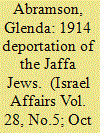

|
|
|
|
|
| Summary/Abstract |
Ahmed Djemal Pasha, Military Governor of the Levant during World War I, instigated two major deportations of Jews from Jaffa during the course of the war, and numerous lesser ones. On 17 December 1914, a day that came to be known as ‘Black Thursday’, the Ottoman ruler of Jaffa, under Djemal’s command, ordered the mass deportation of ‘enemy subjects’, including 6,000 Russian-born Jewish residents of Jaffa. Over the course of the next three months, a few thousand more Russian-born Jews were expelled from Palestine or fled just ahead of the deportations. In total 11,277 Jews were exiled, leaving on various ships that took them from Jaffa to Alexandria. This article describes the ‘Black Thursday’ deportation based on testimonies of those who either witnessed it or were its victims, and briefly on the two works of documentary fiction that provide a rounded context for the many accounts.
|
|
|
|
|
|
|
|
|
|
|
|
|
|
|
|
| 2 |
ID:
190993
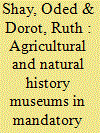

|
|
|
|
|
| Summary/Abstract |
The establishment of agricultural and natural history museums in Jerusalem (1920) and Tel Aviv (1925) by individual and institutional Jewish entrepreneurs was a corollary of the wave of exhibitions and fairs in Western countries that swept across Mandatory Palestine’s Jewish community (Yishuv) in the 1920s. Yet it also reflected Zionist ideals and perceptions and as such served as a catalyst for providing modern agricultural education to the Yishuv’s urban classes.
|
|
|
|
|
|
|
|
|
|
|
|
|
|
|
|
| 3 |
ID:
115335
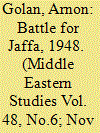

|
|
|
|
|
| Publication |
2012.
|
| Summary/Abstract |
Modern armies conduct military operations in urban areas, but rarely do so willingly. Military commanders prefer fighting in open terrain in which forces freely maneuver and use firepower, rather than in urban areas in which obstacles such as tall buildings, narrow streets, and non-combatants hinder control of the battlefield. Most professional military literature recommends refraining from fighting in urban areas and considering urban battles an unfortunate aberration to be avoided in the future. Deliberate choice of an urban battlefield is quite exceptional, deriving mostly from strategic needs or due to the symbolic value ascribed to a particular city or town. Most decisive battles of the first Arab-Israeli war in 1948 were fought in open areas. However, strategic and political considerations, as well as cultural and sentimental, caused both sides to fight in cities and towns, such as in the case of Jaffa and Tel Aviv metropolitan area, Palestine's major economic center and a main road junction. Both cities also held sentimental value: the dynamically developing modern Jaffa was a symbol of an emerging Palestinian nation while Tel Aviv, the "first Hebrew city," was the Zionist ideal of urban development.
|
|
|
|
|
|
|
|
|
|
|
|
|
|
|
|
| 4 |
ID:
155051
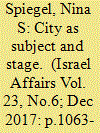

|
|
|
|
|
| Summary/Abstract |
This article investigates the impact of dance on the development of Tel Aviv during the British Mandate of Palestine. It shows how theatrical, salon, and folk dance forms shaped the culture as well as the physical space of the burgeoning city, and how national ideas were encoded into this nexus. The city served as both stage and subject of dancing and choreographic activity.
|
|
|
|
|
|
|
|
|
|
|
|
|
|
|
|
| 5 |
ID:
141609
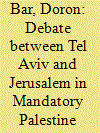

|
|
|
|
|
| Summary/Abstract |
During the Mandate era a custom of re-interment of Jewish thinkers and leaders developed. These were mostly Zionists leaders and ideologists who passed away in the Diaspora and their remains were brought to be buried in Palestine. The article deals with the conflict between Tel Aviv and Jerusalem on the right to re-inter within their boundaries Zionist leaders such as Theodor Herzl, Max Nordau, Leo Motzkin and Yehuda Leib Pinsker. Although this phenomenon was universal, the Zionist case was unique and exceptional as most of the political Zionist activity took place outside of Palestine, mostly in Europe.
|
|
|
|
|
|
|
|
|
|
|
|
|
|
|
|
| 6 |
ID:
143624
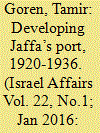

|
|
|
|
|
| Summary/Abstract |
Jaffa port was long renowned as the main harbour of Palestine. From the onset of the British Mandate intense activity in turning it into a modern port resulted in the appointment of a series of committees composed of Arab and Jewish representatives from Jaffa and Tel Aviv. From the start, it was clearly in Tel Aviv’s interest to work for the development of Jaffa port, although the city did not concede its own desire to establish a port of its own; thus the developments taking place at Jaffa port carried implications for Tel Aviv in determining its moves. This article sheds light for the first time on the joint conduct of Jaffa and Tel Aviv regarding the development of the port at Jaffa, and examines its implications. It shows that both cities operated in a considered way before the authorities, and benefited the Jaffa port project, but at the same time Tel Aviv’s ambition for a port of its own was fostered.
|
|
|
|
|
|
|
|
|
|
|
|
|
|
|
|
| 7 |
ID:
177272
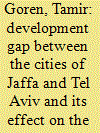

|
|
|
|
|
| Summary/Abstract |
At the time of the British Mandate in Palestine the development of Tel Aviv, which the Jaffa Arabs regarded as the realization of the Zionist enterprise, was perceived as a real threat to Jaffa’s future. The two cities’ geographic proximity threw into bold relief the differences between the two levels of development. As the years passed the two cities’ development demonstrated Tel Aviv’s supremacy over Jaffa. From the years of the Arab revolt (1936-1939) the gap between the development of Tel Aviv and of Jaffa inexorably widened. By time the Mandate ended Jaffa’s condition had so deteriorated that the need to narrow the gap had become urgent. Jaffa had to be transformed into a modern city, but also – indeed principally – to be restored to its former strength and status in the context of the worsening Arab-Jewish conflict. The will to achieve this aim intensified as long as Tel Aviv continued to flourish. The article evaluates how far the chasm between the two cities in their development influenced Jaffa’s condition in the declining years of the Mandate. It shows that it damaged Jaffa, being a significant factor reducing its status as an urban center.
|
|
|
|
|
|
|
|
|
|
|
|
|
|
|
|
| 8 |
ID:
187064
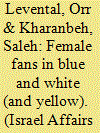

|
|
|
|
|
| Summary/Abstract |
This article examines female basketball fandom in Israel, concentrating on the relationship between gender and ethnonational identity in sport. It is based on two preliminary assumptions: (a) sport is considered a masculine sphere of interest; (b) sport in general, and fandom in particular, are part of the unique sociocultural life; hence patterns of Israeli female fandom are influenced by collective-Israeli ethnonational and gender identity. The article follows the qualitative-narrative approach, using in-depth interviews. Its findings revealed symbiotic relationships between fans’ ethnic-national identity and their fandom for Maccabi Tel Aviv and views of the team’s players.
|
|
|
|
|
|
|
|
|
|
|
|
|
|
|
|
| 9 |
ID:
132456
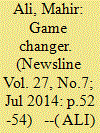

|
|
|
| 10 |
ID:
164323
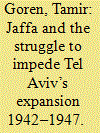

|
|
|
|
|
| Summary/Abstract |
Tel Aviv, which the Jaffa Arabs saw as the realisation of the Zionist enterprise, begot hostility to itself. Insofar as the city developed, it was perceived as a threat to Jaffa. The authorities’ approval of the enlargement of Tel Aviv’s boundaries in the early 1940s was, for the Arab side, a challenge to Jaffa’s future, and spawned the declaration of a struggle to achieve two goals: obstruction of Tel Aviv’s expansion and enlargement of Jaffa’s domain. The article examines the measures taken by the Arab side against Tel Aviv’s expansion, their gains and their implications for Jaffa.
|
|
|
|
|
|
|
|
|
|
|
|
|
|
|
|
| 11 |
ID:
119452
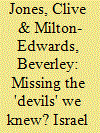

|
|
|
|
|
| Publication |
2013.
|
| Summary/Abstract |
While the immediate outcome of the Iraq War of 2003 was certainly to Israel's strategic advantage, the more immediate and indeed visceral challenge of the ongoing Al-Aqsa intifada has dominated the security horizons of most Israelis. The legacy of this conflict, with its strong Islamist overtones, has clearly had a bearing on how the Arab Awakening has come to be perceived by Israel.
Taking this experience as its starting point, this article examines the response by Tel Aviv to the Arab Awakening at an elite level and how, for the most part, Israeli perceptions of its Islamist essence, an essence that rejects popular accountability, continues to be viewed through a predominantly Realist prism. Such perceptions look set to endure, shaping Israel's immediate attitudes towards the Palestinians and the wider Arab world.
The authors argue that while Israeli concerns over the trajectory of the Arab Awakening do carry empirical weight, such concerns can be equally understood as part of a wider critique with regard to Israel's own emerging democratic deficit. This was seen most recently in a raft of legislative bills put before the Knesset between 2009 and 2012 designed to curb civil liberties in Israel; alongside its continued occupation of Palestinian lands and wider demographic shifts, such moves increasingly tarnish Israel's proud claim to be both Jewish and democratic.
|
|
|
|
|
|
|
|
|
|
|
|
|
|
|
|
| 12 |
ID:
188945
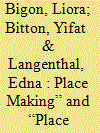

|
|
|
|
|
| Summary/Abstract |
This article expands on the usability of the concepts of “place making” and “place attachment” as recently developed in urban studies research in the context of housing insecurity of marginalized communities in today’s neo-liberal city. Particularly, against the growing threat of urban evictions, the article utilizes a transdisciplinary approach, showing the relevance of both concepts for (a) a better understanding of bottom-up processes of spatial production and attempts to create a sense of place on the part of such communities, and (b) offering an innovative legal strategy for doing justice to these communities in terms of their compensation rights, especially where a title to land has not been registered on a private basis. These issues are critically examined on the site-related case of the Givat-Amal quarter in Tel Aviv, Israel. This district is now under actual final threat of forced evictions following seven conflicted decades with the state, municipal authorities and private entrepreneurs. Our transdisciplinary study is based on qualitative methodologies in human geography such as fieldwork, visual evidence, and interviews, with a glimpse into philosophy. It is equally based on revisiting “traditional” legal property rights through the lens of post-liberal human rights analysis. The argument can apply to many situations of forced evictions across Africa, Latin America, and the West itself.
|
|
|
|
|
|
|
|
|
|
|
|
|
|
|
|
| 13 |
ID:
118473
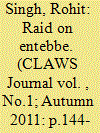

|
|
|
| 14 |
ID:
158069
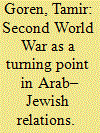

|
|
|
|
|
| Summary/Abstract |
One of the gravest outcomes of the period of the Arab revolt was the heavy economic damage caused to the Arab community. Jaffa, which suffered greatly in the years 1936–1939, sought to rebuild and restore the city to its status as a leading economic center in Palestine. This need intensified still more with the outbreak of the Second World War. Hence, it was in Jaffa's evident interest to bring about an improvement in relations with Tel Aviv and with Jews generally. Problems regarding the proper management of economic life in wartime exercised the Jewish settlement also; therefore, Jewish–Arab cooperation steadily grew in this period. The article gauges the measure of this cooperation and the nature of the ties that consolidated between Arabs and Jews during the war. The situation of Jaffa and Tel Aviv serves as a test case well exemplifying the force of the subsequent change in relations between Jews and Arabs in Palestine.
|
|
|
|
|
|
|
|
|
|
|
|
|
|
|
|
| 15 |
ID:
095111
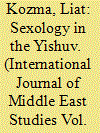

|
|
|
|
|
| Publication |
2010.
|
| Summary/Abstract |
In late 1931, German sexologist and gay-rights activist Magnus Hirschfeld, quoted above, visited Palestine for a lecture tour that attracted hundreds in Tel Aviv, Jerusalem, Haifa, and kibbutz Beit Alfa. By this time, the Jewish settlers' community (or Yishuv) in Mandate Palestine had already been exposed to the science of sexology and to the reform movement it inspired. Sexual-hygiene manuals had been translated into Hebrew and Yiddish in both Tel Aviv and Warsaw. Hebrew readers had access, for example, to translations of Auguste Forel's Sexual Ethics and Max Hodann's A Boy and a Girl. Finally, in the fall and winter of 1931-32, three sex consultation centers were opened in Tel Aviv.
|
|
|
|
|
|
|
|
|
|
|
|
|
|
|
|
| 16 |
ID:
146790
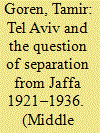

|
|
|
|
|
| Summary/Abstract |
The ordinance granting Tel Aviv the status of local council was given in 1921. Immediately thereafter, the municipal council acted to amend the terms of the ordinance so as to free Tel Aviv entirely from the supervision of Jaffa municipality. Tel Aviv aimed for the status of an independent municipality, but still wished to safeguard its interests in Jaffa. Detachment from Jaffa was for long a central issue for Tel Aviv municipality. The article analyses the Jewish side's stance on Jaffa from 1921 until the outbreak of the disturbances in 1936, when Tel Aviv detached itself almost entirely from Jaffa. In the 1920s, the importance of Jaffa for the Jews was mainly economic, but in the 1930s, the addition of the demographic dimension reflected the growing status of the Jaffa Jewish community and was decisive in increasing the Jewish influence in Jaffa.
|
|
|
|
|
|
|
|
|
|
|
|
|
|
|
|
| 17 |
ID:
116185
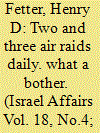

|
|
|
|
|
| Publication |
2012.
|
| Summary/Abstract |
In the summer of 1948, Charles F. Knox, Jr., a career American Foreign Service officer with no prior experience in Middle Eastern affairs, was assigned by the State Department to serve as Counsellor to the initial United States Mission in Israel. White House officials who had overcome State Department opposition to the recognition of Israel in May regarded Knox with suspicion. However, in the course of his service in Israel Knox transcended a Foreign Service milieu that was traditionally hostile to Zionist aspirations as well as his own negative stereotypes about the character of American Jews. The letters Knox sent to family and friends at home, as well as his official dispatches to his superiors in Washington, provide a vivid record of daily life in wartime Tel Aviv as well as a notably sympathetic portrayal of the Israeli people at war.
|
|
|
|
|
|
|
|
|
|
|
|
|
|
|
|
| 18 |
ID:
161391
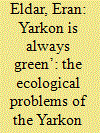

|
|
|
|
|
| Summary/Abstract |
The history of the Yarkon River in the twentieth century reveals the ecological problem of the principal perennial stream flowing almost entirely within the country. Until the 1950s, the Yarkon was a pleasant stream, but the water was insanitary for drinking or swimming. Since the construction and expansion of the Yarkon‒Negev pipeline Project, part of the National Water Plan (since 1955), the water level has gone down and pollution has increased. This article deals with the story of the contamination of the Yarkon, the reflection of this situation in the press, and the failed attempts to purify the river in the decades after the establishment of the State of Israel.
|
|
|
|
|
|
|
|
|
|
|
|
|
|
|
|
|
|
|
|
|